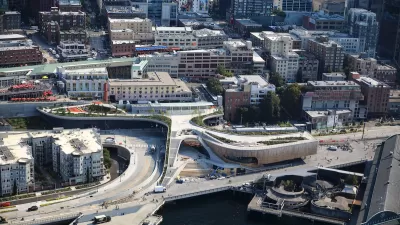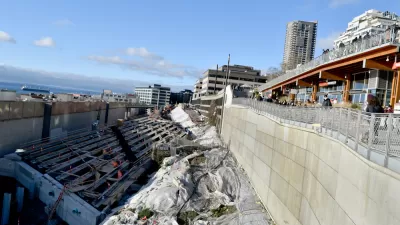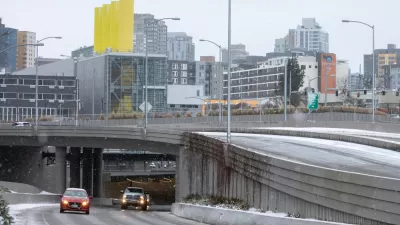With elections coming up, local politicians are peddling various plans for the replacement of the Alaska Way Viaduct -- though there is increasing consensus around removing the freeway and creating a waterfront boulevard.
"The debate about Seattle's Alaskan Way Viaduct used to be a very public, contact sport, but as many local politicians were carted off the field, the controversy moved to a 30-person stakeholders group, who meet very quietly. Meanwhile, the politicians edge back onto the playing field and hint at solutions.
Gov. Chris Gregoire addressed a group of civic worthies Wednesday and dropped broad hints that she is now a fan of the no-tunnel, no-viaduct, surface-plus-transit solution that she used to excoriate. Noting that Seattle is an "international city," Gregoire defined that gauzy term by saying an international city could not possibly have on-street parking downtown or two-way streets. (So much for New York and Paris, but nevermind.) Those may be weird definitions, but they are unmistakable signals that she is buying into the stakeholder group's emerging consensus to divert a lot of viaduct through traffic to Seattle's downtown streets, thus needing only a four-lane, slow boulevard on the central waterfront."
"The story marks a remarkable political journey by local politicians. They have gone from thinking that all the present traffic needed to be accommodated by any solution to the viaduct to thinking in terms of moving people (in various modes), not just cars. All these urban freeways were once paid for largely by federal money. Now they are in need of expensive repair and the feds have fled. One solution is to scrape up local money to rebuild them. When the voters said a loud No to that idea (and the climate change issue moved to the fore), we quietly thought about another approach: removing freeways. It might work."
FULL STORY: Psst! Wanna see the Viaduct disappear?

Alabama: Trump Terminates Settlements for Black Communities Harmed By Raw Sewage
Trump deemed the landmark civil rights agreement “illegal DEI and environmental justice policy.”

Planetizen Federal Action Tracker
A weekly monitor of how Trump’s orders and actions are impacting planners and planning in America.

The 120 Year Old Tiny Home Villages That Sheltered San Francisco’s Earthquake Refugees
More than a century ago, San Francisco mobilized to house thousands of residents displaced by the 1906 earthquake. Could their strategy offer a model for the present?

LA’s Tree Emergency Goes Beyond Vandalism
After a vandal destroyed dozens of downtown LA trees, Mayor Karen Bass vowed to replace them. Days later, she slashed the city’s tree budget.

Sacramento Leads Nation With Bus-Mounted Bike Lane Enforcement Cameras
The city is the first to use its bus-mounted traffic enforcement system to cite drivers who park or drive in bike lanes.

Seattle Voters Approve Social Housing Referendum
Voters approved a corporate tax to fund the city’s housing authority despite an opposition campaign funded by Amazon and Microsoft.
Urban Design for Planners 1: Software Tools
This six-course series explores essential urban design concepts using open source software and equips planners with the tools they need to participate fully in the urban design process.
Planning for Universal Design
Learn the tools for implementing Universal Design in planning regulations.
Ada County Highway District
Clanton & Associates, Inc.
Jessamine County Fiscal Court
Institute for Housing and Urban Development Studies (IHS)
City of Grandview
Harvard GSD Executive Education
Toledo-Lucas County Plan Commissions
Salt Lake City
NYU Wagner Graduate School of Public Service





























